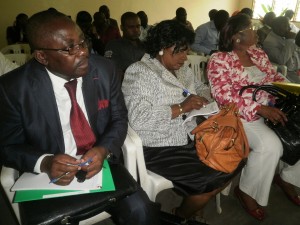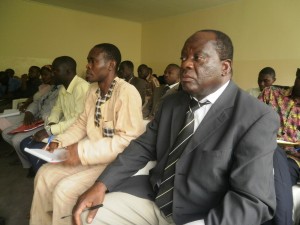By Walter Wilson Nana
Researchers from the National Centre for Education, NCE, have noted that the fight against Climate Change is not a preserve of western ideologies.
At a recent workshop, that held at the Southwest Regional Delegation of Scientific Research & Innovation, on the theme: Adapting to the effects of climate change through the use of indigenous knowledge, Dr. Elizabeth Tumanjong, Director of Research in the Ministry of Scientific Research & Innovation said the climate change phenomenon have been on for three decades with African farmers and their Cameroonian counterparts in particular having some strategies to go around it. “In our research, we gathered that in our villages across the three ecological zones of the country, our farmers have a good and traditional knowledge on what to do. We can’t wait for the Whiteman to come and tell us what to do,” she said.
Tumanjong said their recent research findings indicate that the various farmers, fishermen, hunters, cattle-rearers have strategies on protecting even the wind. “In the Far North, our researchers discovered that farmers have come up with special dikes to protect their farms, their ridges. In the Northwest Region, the people planted Eucalyptus trees to marshy areas to prevent floods. In the Southwest Region, winds have been destroying houses and crops, now farmers have decided to plant trees to protect their houses and their crops. These are working out well,” she explained.
A Researcher at NCE, Jeshma Bakwouri Ntsou said the fight against climate change can’t be based only on scientific knowledge, adding that there is a place for indigenous knowledge. “If we capitalise on traditional knowledge, we’ll have a breakthrough on the fight against climate change,” he noted.
The Agro-Economist and Rural Development Expert mentioned that Cameroonians farmers have a lot of traditional knowledge on adapting to the effects of climate change. “We’re using this workshop, discussions with farmers, exchange of ideas with other professionals and subsequent forums to make known to the public and related ministries what we found out in the field during our research. So, the best practices will be extracted and put up for use by Cameroonians on how to combat the effects of climate change,” he said.
Dr. Henry Nyambele of NCE corroborated his aforementioned colleagues, noting that the climate change phenomenon has been ongoing, especially in the areas of floods and drought. However, he said even in the heart of the climate change difficulties; there have been new ideas on how to tackle them. “That’s why we embarked on this research to know what these new ideas are and to see how we can subsequently exploit them in collaboration with related government and private institutions,” Nyambele added.
On behalf of the Minister of Scientific Research & Innovation, Dr. Madeleine Tchuinté, a representative said no efforts or initiatives towards combating climate change should be taken for granted, especially indigenous ideas, adding that imported ideas have often been out of place and failed in many cases.
The Buea gathering brought together participants from the Far North, North, Northwest, West, Southwest, South and Littoral Regions respectively.
The workshop was organised by the NCE, which is an institution under the supervision of the Ministry of Scientific Research & Innovation.





